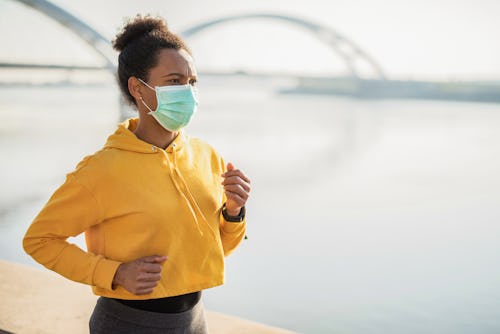Health
The COVID Vaccine’s Effects On Mental Health, Explained
It's “one less barrier to feeling like yourself again.”

The moment Athena, 22, received the COVID-19 vaccine in mid-January, they felt an enormous weight lift off their chest. The health promotion and education student at the University of Utah has spent the last 10 months taking every COVID precaution in the book: living with an autoimmune disorder, Athena couldn’t take the slightest risk of being exposed to the virus. “I've had a fear of just leaving the house to go for a walk, but now having the vaccine means even that small part of my life can go back to normal,” they tell Bustle. “I’m not much of a happy crier, but I happy cried.”
While there are obvious reasons to be excited about the physical benefits of getting immunized, experts say the mental health benefits may be transformative.
“The vaccine provides tangible evidence that we will be able to move about our daily lives again without fear and worry for our safety, or the safety of others,” Melissa Dowd, MS, LMFT, a psychotherapist with the virtual health platform PlushCare, explains. “This is so important for our mental health and provides relief from the constant stress and worry we have all been experiencing.”
The percentage of people dealing with anxiety, depression, or other mental health concerns has sharply risen since the pandemic started. Research by the Centers for Disease Control & Prevention (CDC) showed that 40% of adults in the United States reported struggling with their mental health or substance use at the end of June. A study published in the JAMA Network in September found depression symptoms in the United States were now three times what they were before the pandemic started.
“I’m not much of a happy crier, but I happy cried.”
“Much of the stress is not due just to fear of getting the disease but is also due to loneliness and separation from friends and loved ones,” says Kruti Quazi, LPC, NCC, CCTP, the clinical director at Sesh, an app that offers virtual peer group support. Though people have found creative ways to stay close to each other at a distance, loneliness has remained a pervasive source of stress, anxiety, and depression throughout the pandemic. Mental health experts believe the vaccine will profoundly reduce one’s overall anxiety by making it possible for people to safely reconnect in-person, though public health officials caution that social distancing is best practice until most people are immunized.
Just as the vaccine won’t “turn off” the pandemic, getting immunized won’t be like flipping the switch on your emotions. “Once the vaccine becomes more widely available and restrictions begin to lift, it is very normal that we might feel a bit uncomfortable as we readjust to feeling safe again and develop our new routines, post-vaccine,” Dowd says. Activities or behaviors you’ve avoided for the last year — taking an Uber, or going to dinner at a friend’s house, for example — won’t feel safe until the vaccine is more widely available. Still, Dowd says that even when public health officials give the green light on these activities, it may be anxiety-provoking to move forward. Current practices, like the 6-foot rule, can give a “sense of safety and control” that soothe people’s stress.
“Examining your thoughts and facing your fears are some of the most powerful things that we can do in order to overshadow old learning,” Dr. Russ Morfitt, Ph.D., co-founder and chief psychology officer at Learn to Live, an online therapy platform, tells Bustle. “As you face your fears, you actually should expect that you’re going to feel discomfort. [...] Then along the way, you get the opportunity to learn that you can really handle that discomfort that you feel, and that tends to subside.”
The vaccine is “one less barrier to feeling like yourself again.”
Athena’s experienced this firsthand. Incorporating simple tasks into their day such as going grocery shopping, rather than ordering groceries online, has become an important tool in working through their pandemic-related anxiety. “A part of my depression and anxiety comes from not having a daily routine, [which] has been thrown off by COVID. So, being able to go back to my routine with time will be huge,” they explain. The support of their partner, family, and therapist has also helped them take these small steps forward.
Quazi suggests being mindful that “different people will react at a different pace during this ‘unlearning’ process.” Some immunized people may feel comfortable safely socializing with family members at a distance or running errands. On the other hand, Quazi says, “Others may get vaccinated for their own peace of mind and continue to isolate until there are clear community guidelines in place for reopening.”
Epidemiologists estimate that somewhere between 70% to 90% of people still must be vaccinated before it is safe for the general population to begin returning to pre-pandemic activities, so masking up is still best practice. But after nearly a year spent socially distancing, obsessively sanitizing, or agonizing over every public interaction, the vaccine provides a new hope for people that have been struggling with unchecked stress. As Athena describes it, the vaccine is “one less barrier to feeling like yourself again.”
Experts
Melissa Dowd, MS, LMFT, a psychotherapist with the virtual health platform PlushCare
Kruti Quazi, LPC, NCC, CCTP, the clinical director at Sesh
Dr. Russ Morfitt, Ph.D., co-founder and chief psychology officer at Learn to Live
Studies cited:
Ettman CK, Abdalla SM, Cohen GH, Sampson L, Vivier PM, Galea S. Prevalence of Depression Symptoms in US Adults Before and During the COVID-19 Pandemic. JAMA Netw Open. 2020;3(9):e2019686. doi:10.1001/jamanetworkopen.2020.19686
Czeisler MÉ , Lane RI, Petrosky E, et al. Mental Health, Substance Use, and Suicidal Ideation During the COVID-19 Pandemic — United States, June 24–30, 2020. MMWR Morb Mortal Wkly Rep 2020;69:1049–1057. DOI: http://dx.doi.org/10.15585/mmwr.mm6932a1